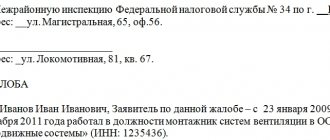The issue of taxation affects every citizen to one degree or another. Constant changes in legislation complicate the already difficult relationship with the Federal Tax Service. The lack of comprehensive knowledge leads to violations that lead to financial penalties. A free consultation with a tax lawyer is the only effective remedy in such a situation.
Emergency professional assistance allows you to quickly respond to dynamic changes. Timely legal advice on taxes will have a positive impact on the well-being of a citizen or organization. Our lawyer will recommend the best ways to optimize mandatory payments to the Federal Tax Service.
All features of taxation, including liability for offenses in this area, are contained in the Tax Code of the Russian Federation.
Four important steps when standing up for what’s right:
- Seeking advice from a tax dispute lawyer.
- Competent preparation of documents necessary for filing with the court.
- Preparation of a petition to suspend the validity of the contested act.
- Payment of state duty.
Legal advice on taxes at every stage will help you avoid unpleasant consequences. Mistakes when protecting your interests are unacceptable. The help of a lawyer in tax disputes will provide an opportunity to assess the prospects of the case and choose the right path for further action.
Reasons for tax disputes
Imagine this situation: the tax authorities conducted an audit and collected an amount of taxes that the entrepreneur clearly did not expect. As a result of the audit, the tax office considered that a 10% rate cannot be applied to certain types of company products and they should be classified according to another OKP. Consequently, the taxpayer is obliged to pay the amount that the tax authorities collected after recalculating the VAT. Depending on what the company does and what its turnover is, the difference sometimes amounts to hundreds of thousands of rubles or even more. Option number one. An entrepreneur can agree with the tax authorities’ decision and pay this money. If the tax office’s decision was made incorrectly, next time it can be used as leverage and the company may be required to do something else. And this directly leads to losses and unnecessary proceedings. Option number two. Protect your rights and appeal the decision of the tax authorities. In difficult situations, you will need the help of a lawyer to collect as much evidence as possible of your correctness and the illegality of the tax authorities’ actions. And how many situations are there when the taxpayer is confident in the correct payment of taxes, but during the audit, serious violations are revealed? What causes violations?
- The taxpayer does not know the tax legislation, chooses dubious ways to optimize the payment of taxes and fees, without thinking about the consequences. In this case, the audit may reveal violations, assess additional taxes, penalties and impose penalties. If you have doubts about the correctness of your tax system, you do not fully understand the legislation, you enter into agreements with different organizations, it is better to reduce risks and consult with a tax lawyer. Everyone faces audits, and it is better to prepare in advance than to deal with the consequences. If, after all, the tax office found violations on your part and ordered you to pay money to the budget, a lawyer will help you find out how lawful the decision was made. There may be options to reduce this amount legally.
- The taxpayer conducts business in accordance with the law, submits reports on time and pays taxes. Even the most honest taxpayer does not always pass the audit for a number of reasons: a technical error was made in the documentation, a complaint was received. Or perhaps you are participating in a chain where you depend on the supplier and buyer of your products, and in this chain there are unscrupulous counterparties, which is why disagreements have arisen.
- Errors on the part of the tax authority. This includes unjustified sanctions, erroneous debits, account blocking, and refusal to refund VAT. These may be purely technical errors that can be easily resolved by providing the necessary documents and explanations.
An experienced lawyer will help you deal with all these situations. There are often situations when, due to a failure in the Federal Tax Service, the reporting of tax paid is not reflected, while the entrepreneur’s account is blocked and the company cannot manage the money and incurs losses.
Most common lawsuits
- Challenging illegal additional charges of fees or taxes.
- Settlement of disputes involving illegal prosecution for tax offenses specified in Chapter 16 of the Tax Code of the Russian Federation.
- Recovery of losses from illegal decisions of the tax authority.
- Collection of material compensation for illegal actions or inactions of tax officials.
- Invalidation of tax audit results.
- Challenging unlawful refusal to accept declarations.
- Challenging the illegal imposition of sanctions by a tax inspector.
In 2014, 56% of court decisions were made in favor of the Federal Tax Service, in 2013 - 70%. A careful study of the internal side of the issue (the reality of transactions) allows us to continue the trend of reducing the percentage of victories of the tax inspectorate.
Main stages of consideration of tax disputes
Preparation and submission of a claim
The positive outcome of the case depends on the correctness of the statement of claim.
Notification of all parties to the dispute
All parties to the dispute are notified of the start of the legal process regarding the claim.
Providing documentation
All documents related to the case must be prepared accordingly
Conducting a court hearing
First the preliminary meeting, then the main meeting
Adoption and execution of a court decision
The court makes a decision indicating the legal grounds, which is subject to mandatory execution
Services of our lawyers
- Providing free legal advice on taxes.
- Optimization of tax payments - review of accrued taxes, search for new taxation schemes.
- Providing assistance in resolving disputes with the tax inspectorate (pre-trial dispute resolution).
- Correct preparation of appeals, complaints and petitions.
- Conducting an appeal case before the court.
- Defense of taxpayer interests in court and before the tax authority.
- Drawing up and maintaining official correspondence with services and bodies involved in the consideration of the case.
- Support of bankruptcy organized by the tax inspectorate.
- Assistance in VAT refund.
- Legal support for on-site tax audits.
The extensive practice of our lawyers in tax disputes makes it possible to resolve even complicated cases in favor of the client. We operate with the latest updates in legislation and rely on extensive experience of specialists. Our specialists are ready to provide you with free legal advice on taxes.
Consultation can be obtained using the application form on the website or simply by calling us. In addition, you can visit our office in Moscow to get a free consultation with a lawyer or lawyer.
Tax advice for individuals
In 2010, I took out a loan from the bank due to a difficult financial situation. In 2012, I was unable to pay this loan, the Bank went to court, enforcement proceedings were initiated on 3 and since February 2013, deductions have been made from my pension in the amount of 50%. Based on the letter of the Ministry of Finance of the Russian Federation dated August 21, 2014 N 03-04-07/41923 on the procedure for imposing personal income tax on amounts of overdue debt under a loan agreement, the economic benefit in the form of savings on the costs of returning principal and/or interest amounts on it and, accordingly, income subject to personal income tax at a tax rate of 13 percent arises if the debt is recognized as bad, in particular, if the court satisfies the claim of the credit organization, but recovery from the debtor under a writ of execution is not possible , the client’s debt may be considered uncollectible and written off from the balance sheet of the credit institution. The Tax Code also clearly states what is considered a bad debt. Article 266 2. Bad debts (debts that are unrealistic for collection) are also debts, the impossibility of collection of which is confirmed by a resolution of the bailiff on the completion of enforcement proceedings, issued in the manner established by the Federal Law of October 2, 2007 No. 229 FZ “On Enforcement Proceedings” “, in case of return of the writ of execution to the claimant on the following grounds: – it is impossible to establish the location of the debtor, his property or to obtain information about his funds and other valuables located in accounts, deposits or deposits in banks or other credit organizations; – the debtor does not have property that can be foreclosed on, and all the measures taken by the bailiff that are permissible by law to recover it. The search for his property proved fruitless. I wrote to the bank with a request to send an updated tax certificate about the lack of income from the ligature so that my debt cannot be considered hopeless, because enforcement proceedings have not been completed and deductions according to Spanish. list occur monthly. To which the bank sent me an answer: that, in accordance with Chapter 8 No. 254-p dated March 26, 2004 of the Bank of Russia Regulations, bad debts are subject to write-off, and the provision is clear that writing off bad debts on a loan is justified if there are certain documents (paragraph 2, clause 8.3 of the regulations). If the loan amount does not exceed 0.5 percent of the credit institution’s own funds (capital), acts of authorized state bodies are not mandatory as such documents; in this case, documents confirming the fact of non-fulfillment by the borrower at least one year before the date of the decision are sufficient. on writing off bad debt on a loan. My opinion is that when preparing the response, the bank took out the context of the phrase from clause 8.3 of the Regulations, because the procedure for actions is specifically described there, also according to the letter of the Min. Fin. dated 08/21/2014 N 03-04-07/41923, when writing off debt from the balance sheet of a credit organization, the client receives an economic benefit in the form of savings on the costs of paying commission amounts and income subject to personal income tax at a tax rate of 13 percent. The date of receipt of income is recognized as either the date of writing off the bad debt from the balance sheet of the credit organization (if there is a resolution of the bailiff on the completion of enforcement proceedings), or the date of writing off the bad debt from the balance sheet of the credit organization to off-balance sheet accounts, provided that the estimated costs of the credit organization for collection debts will be higher than the expected result. In other words, there is a specific reference to the bailiff’s decision on the termination of the execution. Production, which in my case is not there. If the bank wanted to refer to the condition that the expected costs of the credit institution for debt collection would be higher than the expected result, this is absurd - the amount of debt is 65,000 thousand rubles, with monthly payments of 4,000 thousand rubles. I want to go to court to cancel the bank’s decision to recognize my debt as bad and to oblige the bank to send to the Tax Inspectorate an adjusted certificate excluding the entire amount of income. I would like to get some advice, am I thinking correctly?
Entrepreneur mistakes
Tax audits are characterized by their suddenness. Just yesterday everything was calm, but today inspectors are standing on the doorstep asking for access to the premises. And this is always stressful. Often an entrepreneur who has not encountered anything like this makes mistakes. Let's look at the typical mistakes of entrepreneurs and what not to do.
- Solve issues yourself. Tax authorities are not interested in the well-being of your business. The main task of the tax office is timely replenishment of the budget. Accordingly, if a violation is discovered, then it is only your responsibility to prove the opposite.
- Give unnecessary information. Many entrepreneurs mistakenly believe that if they are as sincere and open as possible with inspectors, they will be able to avoid disagreements. Unfortunately, too much information provided often gives rise to finding even more flaws and holding you accountable. The same goes for talkative employees. It is important to instruct key employees to correctly answer only those questions that are directly relevant to the case and not to disclose unnecessary information.
- Agree with additional charges. Do you think it’s easier to accept the arrears and save time? But in reality, you are giving the IRS another reason to keep you on the hook. Next time the arrears may be greater, but you have already paid once, which means you will pay a second time. If you do not agree with something, you have the right to appeal the decision.
- Solve issues using “circumstantial” methods. Attempts to resolve the conflict through connections, cooperation with the tax authorities, as well as through bribes can result in serious consequences, including criminal charges for corruption. Your position can only be justified by law, and a lawyer will help with this, and not a familiar official with whom you are on good terms.
Attempts to “agree” can only aggravate the situation, since there is always a chance that you are under the control of several departments.
Other methods of communication
[email protected] is an email to which you can send a message with a question and receive an answer from competent specialists. You can also ask for help on the page https://www.nalog.ru/rn16/service/obr_fts/, where there are forms for individuals:
- legal;
- physical;
- individual entrepreneurs, etc.
On the official website of the tax office you can make an appointment using a special online form. Communities are available for social network users in:
VKontakte - https://vk.com/federaltaxservice;
Facebook - https://www.facebook.com/FNS.RUSSIA/.
For tax deductions:
For standard tax deductions:
- in what amount and to whom are they provided?
- double deduction
- sample application for standard deduction
For property tax deductions:
when selling property:
- What are the conditions and procedure for receiving?
- The moment of emergence of ownership rights upon receipt of a property tax deduction upon the sale of property
- What documents are needed to obtain a property deduction when selling property?
- Where to apply to receive a property deduction:
- in St. Petersburg (addresses, telephone numbers, websites, operating hours of the regional Federal Tax Service);
- in Moscow (addresses, telephone numbers, websites, operating hours of regional Federal Tax Service);
- find out the address of your tax office (other cities in Russia)
- How much deduction is allowed when selling real estate that was jointly owned?
- How much deduction is allowed when selling real estate that was in shared ownership?
- Property deduction for individual entrepreneurs when selling property
- Tax deduction when selling a car
when purchasing real estate (residential building, apartment, land):
- What are the conditions and procedure for obtaining a property deduction when purchasing real estate?
- What documents are needed to obtain a property deduction when purchasing real estate?
- Application for personal income tax refund (approved by Letter of the Federal Tax Service dated November 22, 2012 No. ED-4-3/ [email protected] )
- Where to apply to receive a property deduction:
- in St. Petersburg (addresses, telephone numbers, websites, operating hours of the regional Federal Tax Service);
- in Moscow (addresses, telephone numbers, websites, operating hours of regional Federal Tax Service);
- find out the address of your tax office (other cities in Russia)
- Frequently asked questions about obtaining a property tax deduction when purchasing real estate
- when buying a home on credit;
- when improving housing conditions (i.e. when selling one home and purchasing another with this money;
- can a non-working person (student, pensioner) receive a property tax deduction
- transfer by pensioners of the balance of the property tax deduction
- receipt by a parent of a deduction for a minor child;
- if the purchase and sale transaction is made between relatives
- How long after purchasing a home can you take advantage of the property deduction?
- What is the difference between joint and shared ownership
- What are the similarities in receiving deductions for joint and shared ownership?
- procedure for receiving a deduction;
- necessary documents for each co-owner to receive a property deduction;
- Application for distribution of property tax deduction between spouses (approved by Letter of the Federal Tax Service dated November 22, 2012 No. ED-4-3 / [email protected] )
- amount of deduction
- Features of obtaining a property tax deduction for joint ownership:
- when registering real estate for one of the spouses;
- when registering real estate for both spouses, one spouse and a minor child, as well as both spouses and children
- Features of obtaining a property tax deduction for shared ownership
- when registering real estate for both spouses;
- when registering real estate for one of the spouses and a minor child;
- when registering real estate for both spouses and a minor child.
For social tax deductions:
- Amount of social tax deduction
- When the amount of deduction is not limited to 50,000 rubles
- Receiving a social deduction for expenses for treatment, education of children, parents and other spouse
- Conditions and procedure for receiving social deductions for treatment and training
Necessary documents to receive a deduction for treatment and training
For professional tax deductions:
- professional deduction for persons engaged in entrepreneurial activities (IP) and persons engaged in private practice (notaries, lawyers who have established law offices, and other persons);
- professional deduction for persons performing work or providing services under civil contracts;
- professional deduction for persons receiving royalties and other royalties.






